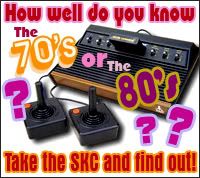Disco Malaria
By: Guillermo Ramos
If Dance Fever was choleric, Discorama was phlegmatic if not downright pathetic.
There was nothing wrong with the Apo Hiking Society—they had musical talent and were certainly better-looking than Tito, Vic, and Joey. But they did not have the diabolical brilliance and street smarts of Joey de Leon.
When I was sixteen, I built a shrine dedicated to my hero/ demi-god/ imaginary lover and muse, Deney Terio, star of the American TV show Dance Fever. The shrine consisted of his portrait, which I asked my carpenter father to make a beautiful frame for, a ceramic vase (I called it vahss) with a plastic gardenia, a miniature disco ball, two votive candles in a glass tumbler, and a garland of sampaguita hanging around his portrait. This garland was replaced with a fresh one every Saturday night. All these objects were crammed into a space measuring 8 by 18 inches. To this day, I wonder why my parents didn't ask me what a voodoo altar was doing on top of the television set. Don’t ask, don’t tell.
At exactly 6.30 pm on Saturday nights, my pet goat Camby and I would arrange ourselves on a tattered olive green bean bag that my father bought from an American couple whose tour-of-duty ended when Sangley Point was handed over to the Philippine Navy in 1970. Deney Terio opens the show with an acrobatic dance routine set to Instant Replay, and my gay little heart threatens to burst out of my concave chest. Then comes 45 minutes of pure excitement: The competition! The celebrity judges! The production numbers! I nearly pass out from joy. Meanwhile, my folks eat their dinner, indifferent to my boundless ecstasy.
When Dance Fever is finished, I repair to the kitchen to get some goodies for Camby and myself. After the commercials, Discorama is on. After Dance Fever, it's like a decompression chamber.
If Dance Fever was choleric, Discorama was phlegmatic if not downright pathetic. Discorama was hosted by the late radio talent-turned-TV personality Bobby Ledesma, grand patriarch of Jakes, coñitos, and insulares. He spoke English with an Ilonggo accent so brittle you could hear it snap like toasted piyaya. I couldn't understand why they had to hire an old guy to host a youth-oriented program—hello, he couldn't even dance. Once, he did a show with a cast on his left foot, proudly announcing he'd stubbed his toes. The dance numbers were uninspired—the dancers were only there to promote the latest disco releases. You had the Vicor Dancers, the Dyna Dancers, the Black Gold Dancers, etc. These were all frigging record labels.
I also couldn't understand why the hosts had to line up firing squad-style, and the two cameras were in the same place. At this point, Camby would have fallen asleep on my lap, dreaming of Deney Terio reincarnated as a goat. After every commercial break, the camera would turn 30 degrees to the right to reveal a bell jar sitting on top of a ledge. Inside it was the specimen touted to be the sexiest Filipina alive, dancing to the tune of Fly Robin Fly. It was none other than Vivian Velez, executor of the dance Salome wouldn't do—the "Body Language". In her tube top and shorts, she resembled Lolita on the verge of a nervous breakdown. Her doe-eyed innocence and snake-like choreography gave birth to rumors of a bootleg betamax tape of Vivian exchanging bodily fluids with Bobby Ledesma, and breaking into song with a microphone (emphasis on "micro") provided by Ledesma himself. The rumor died down immediately because no tape of that sort really existed.
Vivian eventually danced her way out of television and into the movies as supporting actress to Carmen Ronda, whom she handily upstaged.
Discorama's lasting contribution to Philippine culture was the discovery of Tito Sotto, his brother Mar-Vic, and their friend Joey de Leon. Tito, Vic, and Joey became the biggest, most influential TV personalities of the 80s and 90s. Their Tough Hits parodies of popular songs were the very definition of Pinoy humor and double-entendre. Tito, Vic, and Joey became so popular that people would tune in to Discorama just to watch their segment. Their Tough Hits albums were hits, and are bootlegged to this day. They were so huge, they swallowed up the show which spawned them in the first place.
The grim reality of being a big fish in a small pond took its toll on Discorama. Rumor had it that when contract renewal time came around, Tito, Vic, and Joey wanted more money, so Bobby Ledesma gave them their walking papers. This opened the door for the Apo Hiking Society. There was nothing wrong with the Apo Hiking Society—they had musical talent and were certainly better-looking than TV&J. But they did not have the diabolical brilliance and street smarts of Joey de Leon. They did not have the kind of visceral impact that TV&J had. True, the Apo were pillars of OPM (Original Pilipino Music), but Tito, Vic, and Joey ruled!
Meanwhile, TV & J planned a strategy to dislodge Discorama and hurl it to the depths of ignominy. Without them, Discorama was dead anyway. They launched a direct attack on the flagship noontime TV program that dated back to the Jurassic 1950s, Student Canteen, which was also hosted by Bobby Ledesma, among others. Eat Bulaga was born, and the juggernaut was unleashed.
Dance Fever reached saturation point after the release of the two definitive disco movies: Saturday Night Fever and Thank God It's Friday. There were rumors that Deney Terio was the dance trainer and choreographer of Saturday Night Fever , but no matter how many times I paused and rewound the credits on my betamax copy, I never did find Deney Terio's name. I was heartbroken. My icon, my muse and master, was nothing but a second-rate, trying-hard, B-grade TV host. At this point Dance Fever ceased airing weekly, and Discorama followed suit.
My Saturday nights were never the same. My shrine was packed into a shoebox and stored in the bodega, never to be seen again. Meanwhile Camby passed on and reincarnated as caldereta. Discorama defined a period that I want to forget. I'm glad there exists no photographic evidence that will incriminate me in my future reinventions. But Deney Terio, no matter how baduy he was, still has a place in my heart, right next to my inferior vena cava. As for Bobby Ledesma, may he rest in peace.
Also read: The Bar Formerly Known as Penguin Cafe
Technorati Tags:70s, nostalgia












1 comment:
I disagree with your comment that the late Bobby Ledesma spoke English with an Ilonggo accent. He was one of the few hosts who spoke good English. His Ilonggo accent was only noticeable when he spoke in Tagalog.
Post a Comment